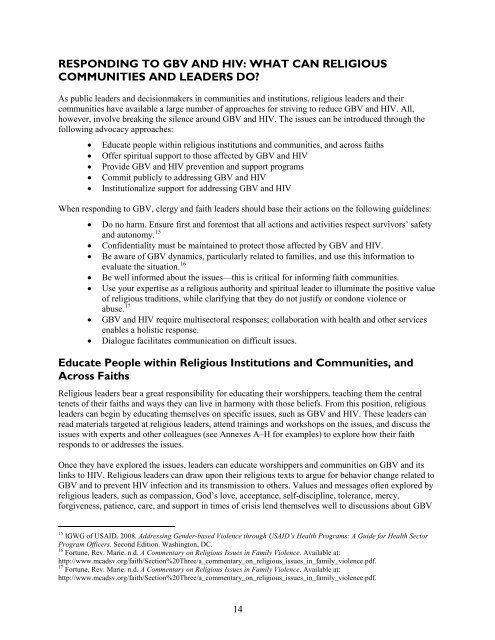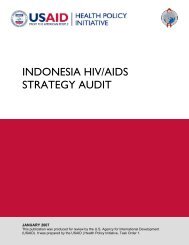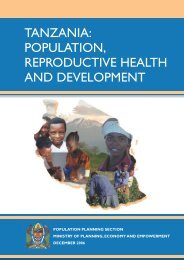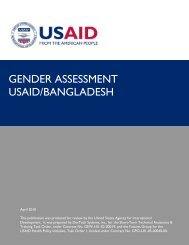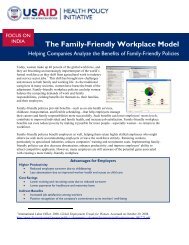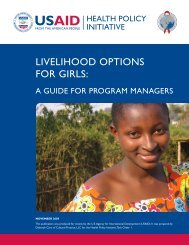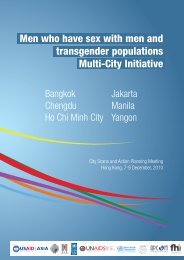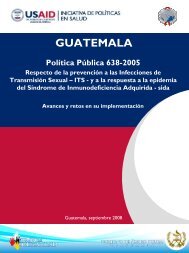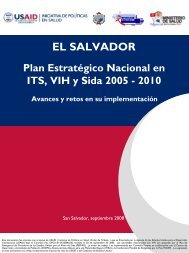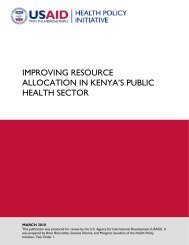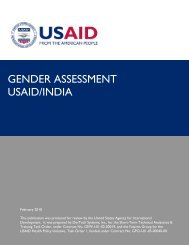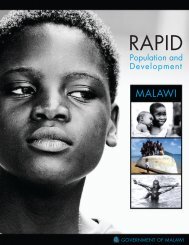A Call to Act - Health Policy Initiative
A Call to Act - Health Policy Initiative
A Call to Act - Health Policy Initiative
You also want an ePaper? Increase the reach of your titles
YUMPU automatically turns print PDFs into web optimized ePapers that Google loves.
RESPONDING TO GBV AND HIV: WHAT CAN RELIGIOUS<br />
COMMUNITIES AND LEADERS DO?<br />
As public leaders and decisionmakers in communities and institutions, religious leaders and their<br />
communities have available a large number of approaches for striving <strong>to</strong> reduce GBV and HIV. All,<br />
however, involve breaking the silence around GBV and HIV. The issues can be introduced through the<br />
following advocacy approaches:<br />
• Educate people within religious institutions and communities, and across faiths<br />
• Offer spiritual support <strong>to</strong> those affected by GBV and HIV<br />
• Provide GBV and HIV prevention and support programs<br />
• Commit publicly <strong>to</strong> addressing GBV and HIV<br />
• Institutionalize support for addressing GBV and HIV<br />
When responding <strong>to</strong> GBV, clergy and faith leaders should base their actions on the following guidelines:<br />
• Do no harm. Ensure first and foremost that all actions and activities respect survivors’ safety<br />
and au<strong>to</strong>nomy. 15<br />
• Confidentiality must be maintained <strong>to</strong> protect those affected by GBV and HIV.<br />
• Be aware of GBV dynamics, particularly related <strong>to</strong> families, and use this information <strong>to</strong><br />
evaluate the situation. 16<br />
• Be well informed about the issues—this is critical for informing faith communities.<br />
• Use your expertise as a religious authority and spiritual leader <strong>to</strong> illuminate the positive value<br />
of religious traditions, while clarifying that they do not justify or condone violence or<br />
abuse. 17<br />
• GBV and HIV require multisec<strong>to</strong>ral responses; collaboration with health and other services<br />
enables a holistic response.<br />
• Dialogue facilitates communication on difficult issues.<br />
Educate People within Religious Institutions and Communities, and<br />
Across Faiths<br />
Religious leaders bear a great responsibility for educating their worshippers, teaching them the central<br />
tenets of their faiths and ways they can live in harmony with those beliefs. From this position, religious<br />
leaders can begin by educating themselves on specific issues, such as GBV and HIV. These leaders can<br />
read materials targeted at religious leaders, attend trainings and workshops on the issues, and discuss the<br />
issues with experts and other colleagues (see Annexes A–H for examples) <strong>to</strong> explore how their faith<br />
responds <strong>to</strong> or addresses the issues.<br />
Once they have explored the issues, leaders can educate worshippers and communities on GBV and its<br />
links <strong>to</strong> HIV. Religious leaders can draw upon their religious texts <strong>to</strong> argue for behavior change related <strong>to</strong><br />
GBV and <strong>to</strong> prevent HIV infection and its transmission <strong>to</strong> others. Values and messages often explored by<br />
religious leaders, such as compassion, God’s love, acceptance, self-discipline, <strong>to</strong>lerance, mercy,<br />
forgiveness, patience, care, and support in times of crisis lend themselves well <strong>to</strong> discussions about GBV<br />
15 IGWG of USAID. 2008. Addressing Gender-based Violence through USAID’s <strong>Health</strong> Programs: A Guide for <strong>Health</strong> Sec<strong>to</strong>r<br />
Program Officers. Second Edition. Washing<strong>to</strong>n, DC.<br />
16 Fortune, Rev. Marie. n.d. A Commentary on Religious Issues in Family Violence. Available at:<br />
http://www.mcadsv.org/faith/Section%20Three/a_commentary_on_religious_issues_in_family_violence.pdf.<br />
17 Fortune, Rev. Marie. n.d. A Commentary on Religious Issues in Family Violence. Available at:<br />
http://www.mcadsv.org/faith/Section%20Three/a_commentary_on_religious_issues_in_family_violence.pdf.<br />
14


